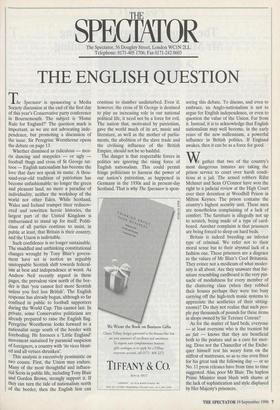SPECT ME AT OR The Spectator, 56 Doughty Street, London WC1N 2LL
Telephone: 0171-405 1706; Fax 0171-242 0603
THE ENGLISH QUESTION
The Spectator is sponsoring a Media Society discussion at the end of the first day of this year's Conservative party conference in Bournemouth. The subject is 'Home Rule for England?' The question mark is important, as we are not advocating inde- pendence, but promoting a discussion of the issue. Sir Peregrine Worsthorne opens the debate on page 13.
Whether dismissed as ridiculous — mor- ris dancing and maypoles — or ugly football thugs and cross of St George tat- toos — English nationalism has become the love that dare not speak its name. A thou- sand-year-old tradition of patriotism has become unfashionable: no longer the green and pleasant land, no more a paradise of individuality, neither the workshop of the world nor other Eden. While Scotland, Wales and Ireland trumpet their rediscov- ered and rewritten heroic histories, the largest part of the United Kingdom is embarrassed to stand up for itself. Politi- cians of all parties continue to insist, in public at least, that Britain is their country, and the Union is indivisible.
Such confidence is no longer sustainable. The muddled and unthinking constitutional changes wrought by Tony Blair's govern- ment have set in motion an arguably unstoppable Scottish shift towards federal- ism at best and independence at worst. As Andrew Neil recently argued in these pages, the prevalent view north of the bor- der is that 'you cannot feel more Scottish unless you feel less British'. The English response has already begun, although so far confined in public to football supporters during the World Cup. This cannot last. In private, some Conservative politicians are already prepared to raise the English flag. Peregrine Worsthorne looks forward to a nationalist surge south of the border with foreboding. He foresees a 'Little England' movement sustained by paranoid suspicion of foreigners, a country with 'its vices bloat- ed and all virtues shrunken'.
This analysis is excessively pessimistic on two counts. First, the Union may endure. Many of the most thoughtful and influen- tial Scots in public life, including Tony Blair and Gordon Brown, strongly support it. If they can turn the tide of nationalism north of the border, then the English lion can continue to slumber undisturbed. Even if, however, the cross of St George is destined to play an increasing role in our national political life, it need not be a force for evil. The nation that, motivated by patriotism, gave the world much of its art, music and literature, as well as the mother of parlia- ments, the abolition of the slave trade and the civilising influence of the British Empire, should not be so bashful.
The danger is that respectable forces in politics are ignoring the rising force of English nationalism. This could permit fringe politicians to harness the power of our nation's patriotism, as happened in Germany in the 1930s and in present-day Scotland. That is why The Spectator is spon- soring this debate. To discuss, and even to embrace, an Anglo-nationalism is not to argue for English independence, or even to question the value of the Union. Far from it. Instead, it is to acknowledge that English nationalism may well become, in the early years of the new millennium, a powerful influence in British politics. If England awakes, then it can be as a force for good.
We gather that two of the country's most dangerous inmates are taking the prison service to court over harsh condi- tions at a jail. The armed robbers Rifat Mehmet and Sean O'Connor have won the right to a judicial review at the High Court over their detention at Woodhill Prison in Milton Keynes. The prison contains the country's highest security unit. These men are nonetheless complaining of a lack of comfort. The furniture is allegedly not up to scratch, being made of a type of card- board. Another complaint is that prisoners are being forced to sleep on hard beds.
Britain is indeed breeding an inferior type of criminal. We refer not to their moral sense but to their abysmal lack of a fashion one. These prisoners are a disgrace to the values of Mr Blair's Cool Britannia. They evince not a modicum of what moder- nity is all about. Are they unaware that fur- niture resembling cardboard is the very pin- nacle of modishness for every member of the chattering class (when they robbed their houses perhaps they were too busy carrying off the high-tech music systems to appreciate the aesthetics of their sitting- rooms)? Do they not realise that such peo- ple pay thousands of pounds for these items in shops owned by Sir Terence Conran?
As for the matter of hard beds, everyone — at least everyone who is the teeniest bit au fait — knows that they are beneficial both to the posture and as a cure for snor- ing. Does not the Chancellor of the Exche- quer himself rest his weary form on the stiffest of mattresses, so as to rise even fitter for his great task the following day — or so No. 11 press releases have from time to time suggested. Alas, poor Mr Blair. The hapless Prime Minister must blush with shame at the lack of sophistication and style displayed by Her Majesty's prisoners.










































































 Previous page
Previous page